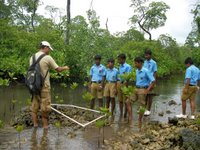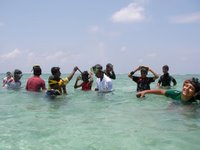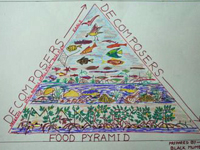| |
|
|
|
Environmental
Education Through awareness
and outreach activities CARESS seeks to inform the public
(students, teachers, fishermen, women, policy makers, resort
owners and tourists) of the broad environmental issues linked
to various ecosystems such as the Coral reefs, Mangroves,
Himalayas and their adaptations to climate and the interactions
of people and the environment in which they live.
CARESS conducts children's camps and teachers
training workshops to provide coastal environment orientation
to school education. We use various outreach activities such
as quiz, games, drawing and painting competitions, seminars,
field trips, puppet shows, role plays, street rally to get
the message across.
Our program "The children's perception
of the environment" provides an educational
experience and is designed to promote better understanding
of how nature works and to create an appreciation for the
value of our natural heritage in order to guide the children
to live more sustainably on the planet. It is an action research
program for students and creates awareness through the following
stages.
- What do we know? (our knowledge)
- What do we want to know? (articulating the
problem)
- How do we go about it? (planning the research,
field trip,computer search)
- What have we learnt? (zeroing in on key learnings)
- How do we communicate our key learnings.
(language and creativity)
By the end of the program students will be able
to understand:
- Basic ecology of ecosystems using the metaphor
of a village or city life to explain how the ecosystem functions.
- The functional role of key species in the
ecosystem and how they collectively form the web of life.
- The many connections humans have to the environment.
- How the fundamental principles of ecology
(energy, matter, biodiversity/adaptations, connections)
can serve as a guideline for better design of sustainable
human communities.
In this manner it is hoped to create stewards
for the environment and foster responsible behaviour towards
cultural and environmnet biodiversity, create demand for change,
and the development of responsive policy and practical conservation
solutions.
CARESS networks with global and regional partners
in order to bring global concerns to the local level and highlight
local concerns at the global level.
 |
 |
 |
Mangrove Field Trip
Havelock |
Reef Study Minicoy |
Tropic Chart |
|
|
